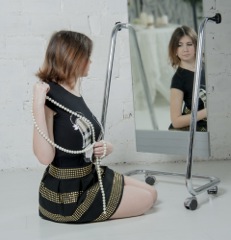October 4, 11 & 18, 2016
29600 NORTHWESTERN HWY., STE 100A
SOUTHFIELD, MI 48034
This seminar will discuss the role animals play both in the lives of therapists and their patients. Attitudes about companion animals will be surveyed and analyzed for clinical consideration. The ethics of prescribing therapy animals will also be covered.
Paul Shultz, ACSW has been a practicing psychotherapist for 31 years. He is a faculty supervisor of IIGP and holds the position of Past President. He is past president of the Michigan Group Psychotherapy Society. Mr. Shultz has presented on many workshops at the local and national levels. He is in a unique position to understand the powers of behavior change in a therapeutic setting, he has published professional papers in the area of Patient change.
To register for upcoming seminars, please email or call Deborah@iigp.org or 248.353.5333
 Picture this scenario: You are in the market for a car, and you know that you’ll need to finance it somehow. You go to your bank, tell them you need their help with buying a car, and in response the loan specialist at the bank hands you a booklet entitled: “These are the cars we’re willing to help you finance. Otherwise, you’ll have to pay for the whole thing yourself.” Catchy title, isn’t it? So you go home, sit down and read through the booklet and pick one of the ten cars listed so that you can receive financing from the bank. It’s not the car you had in mind, it’s the wrong size and color and it doesn’t have a roof rack for your canoe. But it’s on the list so you have no choice but to buy it. Right?
Picture this scenario: You are in the market for a car, and you know that you’ll need to finance it somehow. You go to your bank, tell them you need their help with buying a car, and in response the loan specialist at the bank hands you a booklet entitled: “These are the cars we’re willing to help you finance. Otherwise, you’ll have to pay for the whole thing yourself.” Catchy title, isn’t it? So you go home, sit down and read through the booklet and pick one of the ten cars listed so that you can receive financing from the bank. It’s not the car you had in mind, it’s the wrong size and color and it doesn’t have a roof rack for your canoe. But it’s on the list so you have no choice but to buy it. Right? What advantage does group therapy have over only individual therapy? Using an analogy, let’s say therapy is akin to going clothes shopping. Often, when one goes clothes shopping they have only a single mirror in front of them, reflecting back what they look like. You might turn to one side or the other, trying to see if your belly is protruding, or gauging whether how tight or ill-fitting a garment might be on your posterior. However, if you’re lucky, you’ll come across a dressing room that comes well equipped with a three-sided mirror that gives you multiple vantage points from all sides. Following those shopping excursions, you may tend to get a more accurate view of your outfit, which also may translate into better eating habits and more exercise (should your clothes not fit so well, etc.) Sticking with the analogy, the reasons for making some lifestyle choices seem obvious: multiple perspectives allow you to see all your profiles at once.
What advantage does group therapy have over only individual therapy? Using an analogy, let’s say therapy is akin to going clothes shopping. Often, when one goes clothes shopping they have only a single mirror in front of them, reflecting back what they look like. You might turn to one side or the other, trying to see if your belly is protruding, or gauging whether how tight or ill-fitting a garment might be on your posterior. However, if you’re lucky, you’ll come across a dressing room that comes well equipped with a three-sided mirror that gives you multiple vantage points from all sides. Following those shopping excursions, you may tend to get a more accurate view of your outfit, which also may translate into better eating habits and more exercise (should your clothes not fit so well, etc.) Sticking with the analogy, the reasons for making some lifestyle choices seem obvious: multiple perspectives allow you to see all your profiles at once. But a therapeutic group has other advantages over an individual setting as well. The group setting is a closer match to real life. Ideally, the group is a healthy mix of people: young and old, men and women, varied ethic/racial groups, differing economic and educational backgrounds, etc.
But a therapeutic group has other advantages over an individual setting as well. The group setting is a closer match to real life. Ideally, the group is a healthy mix of people: young and old, men and women, varied ethic/racial groups, differing economic and educational backgrounds, etc.
 It is widely understood that the body is the subconscious mind. Whether you are a budding psychotherapist or a veteran in the field, your own body is really the instrument of your work.
It is widely understood that the body is the subconscious mind. Whether you are a budding psychotherapist or a veteran in the field, your own body is really the instrument of your work.